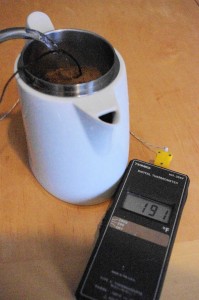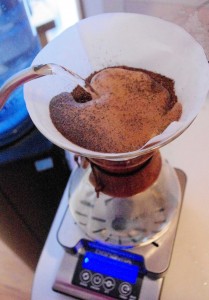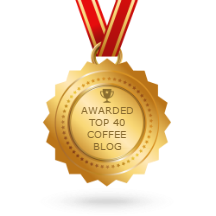Is brewing a science or an art?
A colleague recently posted this article on Linked-In. http://www.ajcoffeeco.com/blog/coffee-brewing-science-or-art/?goback=%2Egde_43141_member_5796946764351184896#%21
It’s a fairly concise piece that attempts to answer its question, but along the way I find it gets confused. It makes the point that a true professional barista should not need to use a scale and that an accomplished coffee barman should be able to make a decent espresso with no extra equipment. The author then encourages the barista to use more eye contact while making the drink for their customer.
All this may be appropriate advice, but I’m afraid I find it ultimately unhelpful. Rather than disassemble their perhaps well-intentioned article, I’m going to simply put forth my own views on this subject.
The headline’s question is a good one. My answer is brewing is a science to make a cup of coffee – which I consider a work of art. Brewing is chemistry. We are attempting to use water as a solvent, which the heat enhances, which is why we heat the water. From then on it’s time and terms. The longer we have contact between the water and the grounds the more coffee flavor matter we extract. Now, there is an element of art involved – that is the subjective decision of how much is enough. Truthfully, there is no right answer. The fact that different parts of the world have different brewing standards shows us this. But, a good barista, or any of us when we brew, should be aiming to brew it to the tastes of the person who will be drinking it, and the methodology we use should be thought out and repeatable. Hence, it is both art and science.
Items like scales, thermometers, measuring spoons are designed to make the process measurable and repeatable. I recall the bad old days of the 1990s when in the Specialty Coffee Gold Rush, I met many entrepreneurs who were convinced their product was 100% art, and they claimed no matter how you brewed their coffee, it tasted great, far better than so-called commodity coffee. In fact, I felt some of these folks viewed people like me who promoted the importance of brewing as simply geek-types who could take the fun out of anything with our measuring obsession.
I think it’s gotten to the point in history where most people in the coffee industry and many consumers accept the fundamental truth that the brewing process is vital and of equal importance with a well-bred, cared for, properly roasted bean in order to make a good-tasting cup of coffee. The word “decent” is a word I reserve for commodity in both product and experience. I am sure I could guess my way through the brewing process and get a decent cup, just as when cooking I could guess at my stove temperature, time and spices and get “decent” food. But, why would I?
As far as eye contact, I often choose a simpler method to brew coffee when entertaining. Most cafes offer two tiers of brewed coffee: there is bottle-brewed coffee made (hopefully) hourly and stored, then dispensed quickly and at a competitive cost. The extra time and cost applied at the brew bar is to achieve an ultimate, fresh and flavorful cup. The freshness alone should justify the extra effort to someone who’s going to sit and savor that cup. Using tools such as a scale to make it as exact as possible is simply common sense. There’s no hocus pocus about it.
I do not always use a scale under my Chemex, but this is because I’ve brewed with one for twenty years. I know where 750 weighed grams of brew lies on my brewer, but this does not mean I do not measure.
There surely are connoisseur practices that, while possibly enhancements, I separate them from good brewing practices. For instance, the ritual of pouring hot water to wet the filter before brewing is, in my experience, optional. Carefully measuring both water and grounds, whether weighing or using a measuring spoon, is not an option. Grinding using the best appliance affordable just before brewing, is a given, not an option. My wife always rinses her cup with boiling water before I pour her cup. I consider that an option. Timing the contact between water and grounds is critical and determines the grind I use and is not an option. I never guess at measurements. As much of a storyteller as I am, when I’m entertaining, I always beg the guests’ indulgence with my breaking eye contact with them as I prepare our coffee. The few times I have broken that rule we have paid for it.
While coffee brewing is a science, this does by no means mean that all the science is known, and searching for right practices can be considered an art. For instance, after pouring hot water into a press pot, how much do you stir? Stirring, as those of us who brew regularly with this method know, facilitates extraction. One reason the vacuum brewing method is so highly regarded is its inherent water agitation causes it to extract so efficiently. Both the stirring of a press and the bubbling vacuum are hard to measure. Obviously there is a formula at work, but who knows it? I don’t and I have yet to meet anyone who does.
So my complete answer is coffee brewing remains both an art and a science. As Chesterton said, “Art, like morality consists of drawing a line somewhere.” Some years ago an inventor introduced a product that fit over our ears that would enhance our ability to hear music. Although every review confirmed the product worked, it did not sell well. Apparently there are limits to which connoisseurs will go for even the most rewarding hobby. My advice is to continue to measure and treat coffee brewing as a science, with the caveat that much is still unknown, including just how you and your friends like to drink it. My guess is you’ll enjoy your coffee and not ruin your life by making your rituals too obsessive.




Kevin,
Enjoyable article on a topic which needs far more discussion within the specialty coffee industry.
A few years back, an SCAA discussion group asked for feedback from columnists who cover food & drink – & coffee! Two were West Coast (sadly spewing out the common line). The 3rd was a fellow from the New York Times. He said up straight, the industry is too clever for itself. The “great science” of brewing & espressing coffee has reached a point where it is a turn-off for most people on the street. It’s not fun anymore. It’s all this measuring stuff. He compared our industry very poorly with the wine industry.
Somewhere there is a point where there is enough science & where there is enough art. You just can’t lump any amount of coffee into your Hario-V60. But measuring to the last gram is bizarre – given the fact coffee grows on bushes. On farms where soil types, topogaphy, exposure & – the big one – farming practices – all make for a wonderful coffee which is NOT homogenous by any stretch of any scientific measuring tool . After all that, the coffee beans are collected, sorted, processed by hand (the good stuff, that is). In all that production & procurement, there is a whole lot more than 1 gram of variance.
For me, its one part science, one part art, two parts passion. Brewing or espressing coffee purely by the numbers is like painting by numbers. There must be a basic intricate knowledge of the science behind our product. But without an understanding of where coffee comes from, who our customers are & without a passion for what you are presenting, all the numbers in the world wouldn’t count to much.
Cheers,
Dave McLaughlin.
President, Safari Roasters (www.safaricup.com)
Thanks, Dave. Needless to say we are in agreement. Interesting examples. Since you brought up wine, which the coffee business obviously views as its success model, I suggest that wine comes preassembled while coffee is still a kit. No getting around it. I suggest outdoor grilling is closer to brewing coffee. You buy the best quality steak you can. you get the grill to an exact temperature. I see my neighbors outdoors all summer carefully lifting the corners of their grilling meat to check to see that the grill marks are just so before flipping them over. No one calls them pretentious nerds! It’s part of the passion you’re talking about. As far as bean consistency, I always find the first few brews into a pound of fresh coffee are discovering where its best flavor is. I vary the measurements until I find my sweet spot. But I still measure, so I can remake the same great taste I find when friends come over.
Well said.
One other interesting thing: when things go sideways. When you realize, for example, that you forgot to reset the grinder after the variation you did the night before — or that you forgot to tare the scale for that container you measure the coffee in, or even that by mistake you just used the water you used to pre-heat your cup rather than the water you heated IN another cup, to brew.
That is, what happens when you err? Is the cup salvageable? How likely are you to recover your wits, recalc on the fly, and derive a great cup from a potential bummer?
This alone is good reason to become literate with and exercise care with the brewing variables. A rock climber is in great shape, and familiarizes herself with a lot of possible scenarios. The coffee geek is the same way — familiar with various methods AND techniques, all of which leverage the variables in somewhat different ways and demand different things be dialed in differently. This literacy — which you can’t Google — this experience, I say, allows you to recover your footing in almost any situation where accident and unintended consequence arises. It also helps you in situations where some variables are beyond your control, or where absolutely unsatisfactory variables are forced. What if you’re stuck brewing with 180 degree water? What will it take to get as good a cup as possible from that? If you don’t know, your experience is incomplete.
Athletes train and stretch in part for performance, but also to avoid injury. Likewise, training as brewers prepares us both for good performance under ideal circumstances where we can control for things, but also for those occasions where things are kind of nuts but we still want — even need — to deliver a great cup to someone.
There’s no excuse for not being able to catch a fish or a rabbit in a survival situation and feed one’s family. Likewise, there’s no excuse for a true coffee geek failing to deliver a good cup under sub-optimal circumstances.
Only the kind of attention to detail that you’re talking about, Kevin, lends the kind of experience that allows seat-of-the-pants adaptation to bad situations.
Thank you, Scott. Lots of content in your post. I often point out to my industry friends that many of them simply toss out their mistakes, whereas most of mine I pay for at full retail price, so I have to tweak along the way. I don’t want to overwhelm people who want good coffee at home but do not wish to become geeky about it. There are simple methods that are not overly complicated. But they require measuring and setting grind correctly. Making coffee is a culinary art. I separate my own passion for coffee from ritual making it, but there must be some adherence to the rigors of making it. Truthfully, coffee is still a social activity as much as a culinary art, so I believe I strike a reasonable balance when I combine them. What does anyone think is the easiest, acceptable brewing method requiring the least attention to rituals and measurements? What are pitfalls of methods you would warn of that might not be apparent to an entry level coffee enthusiast?
I say: neither. Let’s keep both feet on the ground folks. Just because you occasionally measure things, doesn’t mean you’re a scientist. And just because you’ve developed certain skills, doesn’t mean you’re an artist. You’re not a researcher, venturing into uncharted territory, developing new theories, testing hypotheses. Neither are you creating something new, unique, and beautiful every time you brew a cup. what a good barista does is brewing good coffee, and offering service to his/her customers. At best, you’re a cook, waiter, and entertainer at once; an artisan in the high end of the hospitality industry. No science, no art.
I’m happy to acknowledge we’re not shooting off a moon rocket when we brew coffee, Robert. Since I know you are careful and knowledgeable from your various activities I suspect you are downplaying your role. Making coffee is really cooking. Cooking involves recipes. We just had Thanksgiving here in the States. I can’t imagine any cook just flipping the dial on somewhere near 300-400F to cook their turkey. Nor not using a timer at least to check on it. I agree there’s no reason to overstate it, but I don’t want to go back to the days when the coffee trade was thinking itself the “new wine” and as long as you bought the most expensive beans, you were set. This may put us in a friendly disagreement. Actually, I’m hoping treating coffee as an art and science will result in less uniqueness and more consistency.